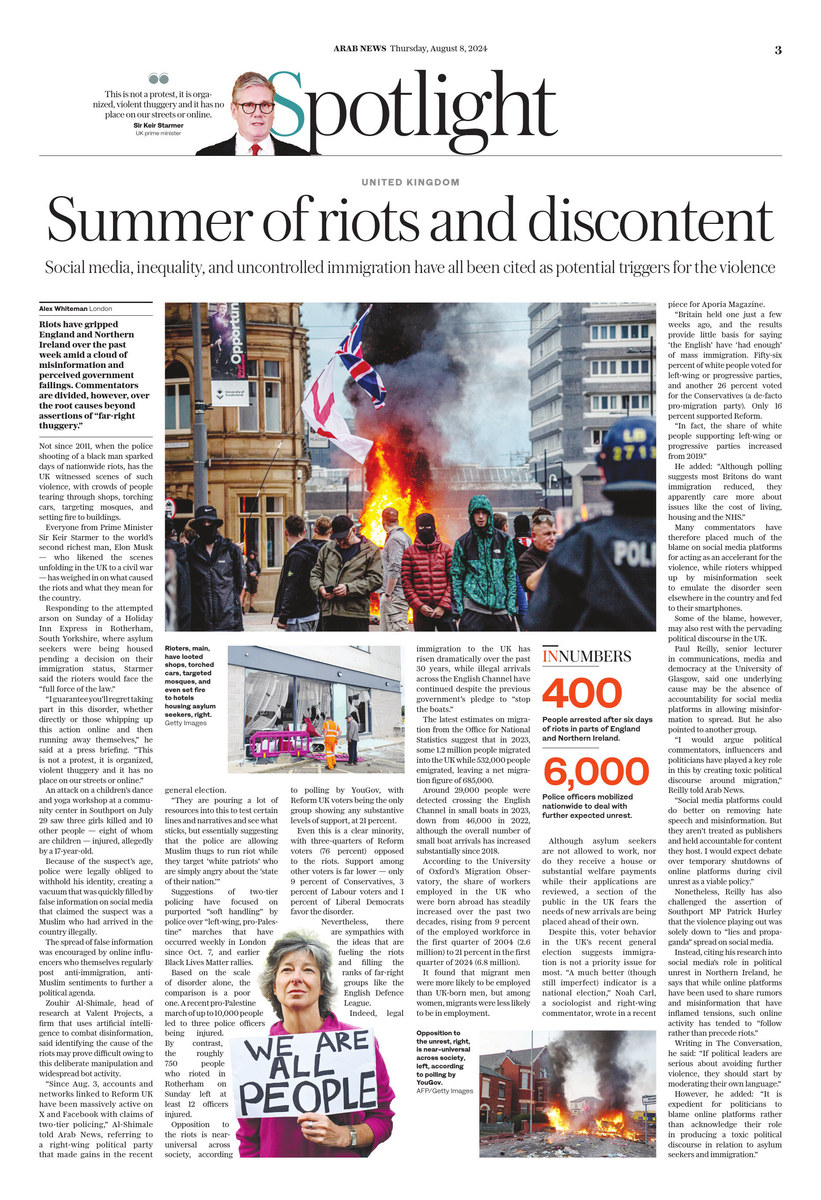LONDON: Riots have gripped England and Northern Ireland over the past week amid a cloud of misinformation and perceived government failings. Commentators are divided, however, over the root causes beyond assertions of “far-right thuggery.”
Not since 2011, when the police shooting of a black man sparked days of nationwide riots, has the UK witnessed scenes of such violence, with crowds of people tearing through shops, torching cars, targeting mosques, and even setting fire to hotels hosting asylum seekers.
Everyone from Prime Minister Sir Keir Starmer to the world’s second richest man, Elon Musk — who likened the scenes unfolding in the UK to a civil war — has weighed in on what caused the riots and what they might mean for the country.

Britain's Prime Minister Keir Starmer delivers a speech during a press conference following clashes after the Southport stabbing, at 10 Downing street in central London on August 1, 2024. (AFP)
Responding to the attempted arson on Sunday of a Holiday Inn Express in Rotherham, South Yorkshire, where asylum seekers were being housed pending a decision on their status, Starmer said the rioters would face the “full force of the law.”
“I guarantee you’ll regret taking part in this disorder, whether directly or those whipping up this action online and then running away themselves,” he said at a press briefing. “This is not a protest, it is organized, violent thuggery and it has no place on our streets or online.”
Such has been the severity of the damage caused to communities and the number of injuries to police officers that the director of public prosecutions, Stephen Parkinson, has said some of those arrested could face charges of terrorism.
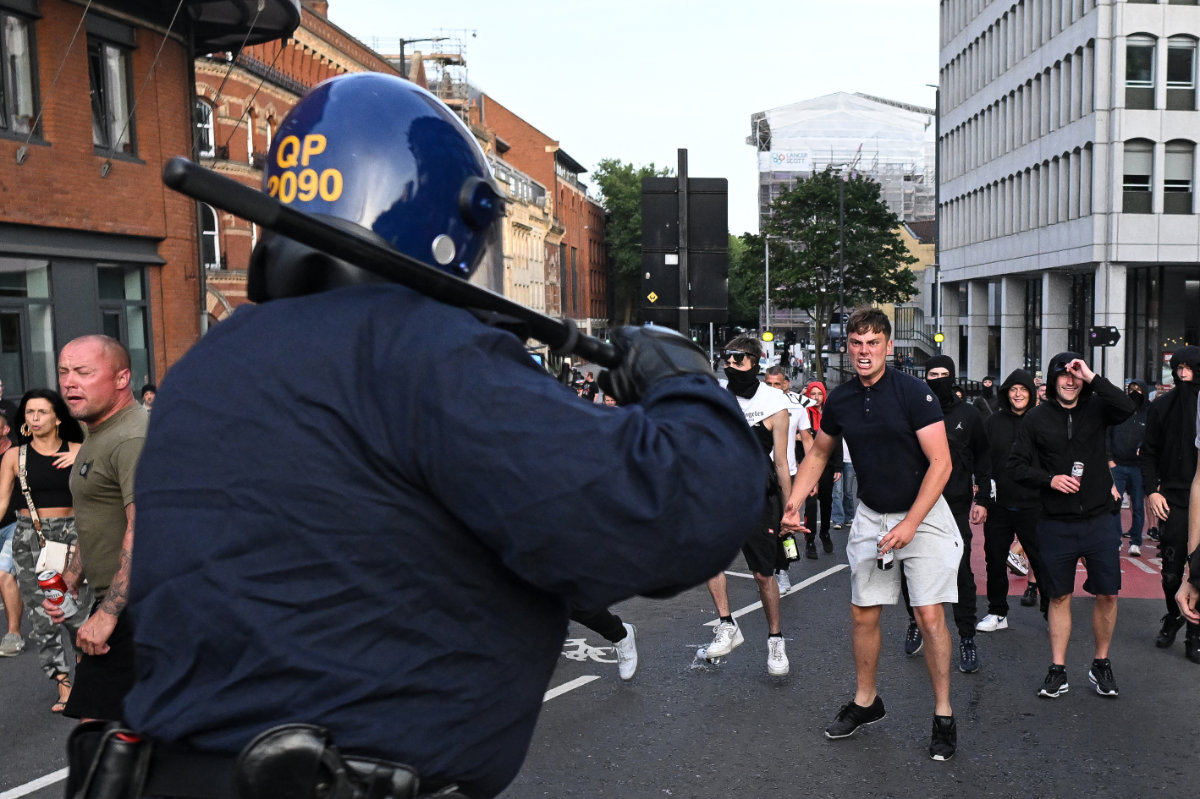
Riot police face far-right protesters in Bristol, England, on August 3, 2024 during the 'Enough is Enough' demonstration held in reaction to the fatal stabbings in Southport on July 29. (AFP)
Speaking to the BBC, Parkinson said: “Where you have organized groups planning activity for the purposes of advancing an ideology and planning really, really serious disruption, then yes, we will consider terrorism offenses.
“Yes, we are willing to look at terrorism offenses, and I am aware of at least one instance where that is happening.”
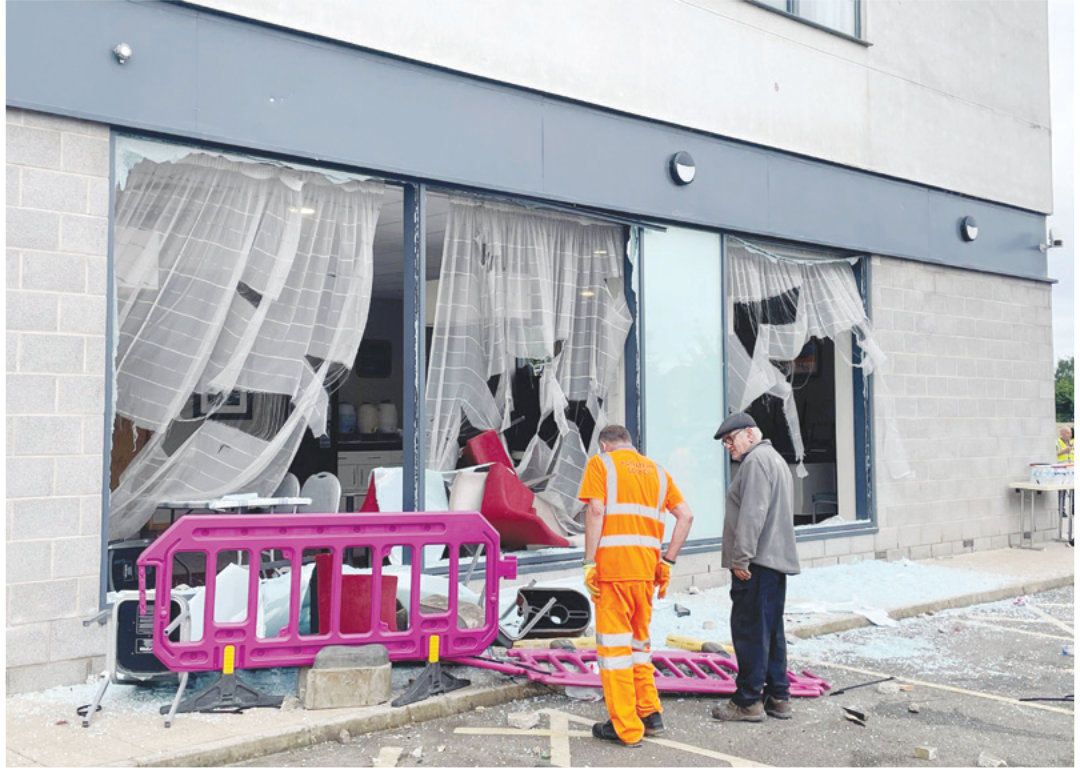
Rioters have looted shops, torched cars, targeted mosques, and even set fire to hotels housing asylum seekers. (Getty Images)
Sources who spoke to Arab News did not disagree with assertions that the violence was anything more than “violent thuggery.” However, they warned against dismissing the need to examine underlying societal issues.
One source, who works in education and asked not to be identified, said the disorder has come on the back of an election campaign that tapped into legitimate concerns by seeking to blame the country’s ills on the purported negative effects of mass immigration.
“Mix this with misinformation surrounding the identity of the murderer of girls which served as the riots’ catalyst, and what you are seeing is chickens coming home to roost,” the source said.
Opinion
This section contains relevant reference points, placed in (Opinion field)
An attack on a children’s dance and yoga workshop at a community center in Southport, north of Liverpool, on July 29, saw three girls killed and 10 other people — eight of whom are children — injured, allegedly by a 17-year-old.
Because of the suspect’s age, police were legally obliged to withhold his identity, inadvertently creating a vacuum that was quickly filled by false information circulated on social media that claimed the suspect was a Muslim who had arrived in the country illegally.
The spread of false information was not helped by the chiming in of online influencers who themselves regularly post anti-immigration, anti-Muslim sentiment to boost a political agenda.
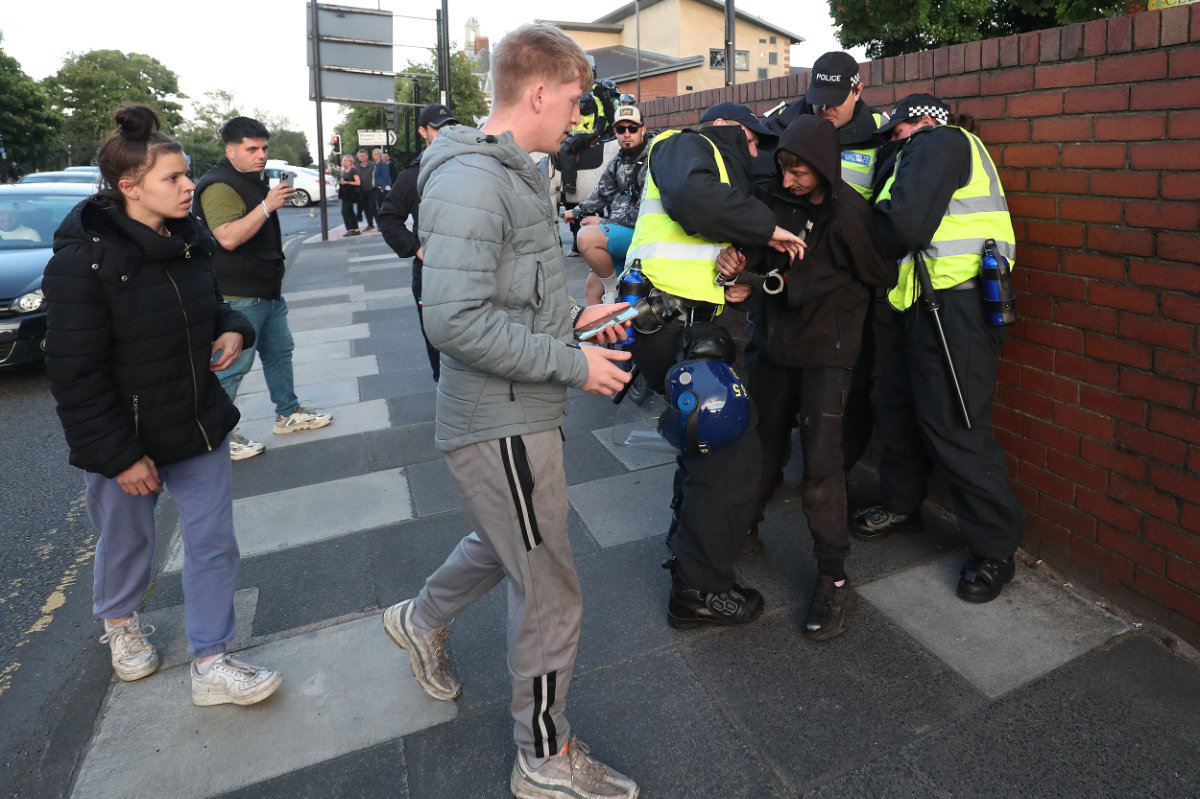
Police officers detain a person for shouting racist comments during a counter-demonstration against an anti-immigration protest called by far-right activists, near the United Immigration Services offices at The Beacon in Newcastle-upon-Tyne, nEngland on Aug. 7, 2024. (AFP)
Zouhir Al-Shimale, head of research at Valent Projects, a UK-based firm that uses artificial intelligence to combat disinformation, said identifying the root causes of the riots may prove difficult, as there has been a blend of deliberate manipulation by those pushing an anti-immigrant agenda and widespread bot activity.
“Since Aug. 3, accounts and networks linked to Reform UK have been massively active on X and Facebook with claims of two-tier policing,” Al-Shimale told Arab News, referring to a right-wing political party that made gains in the recent general election.

Protesters hold placards during a 'Enough is Enough' demonstration called by far-right activists near a hotel housing asylum seekers in Aldershot on August 4, 2024. (AFP)
“They are pouring a lot of resources into this to test certain lines and narratives and see what sticks, but essentially suggesting that the police are allowing Muslim thugs to run riot while they target ‘white patriots’ who are simply angry about the ‘state of their nation.’”
Suggestions of two-tier policing have focused on purported “soft handling” by police over “left-wing, pro-Palestine” marches that have occurred weekly in London since Oct. 7, and earlier Black Lives Matter rallies.

Counter-protesters gather in Bristol, southern England, on August 3, 2024 against the 'Enough is Enough' demonstration held in reaction to the fatal stabbings in Southport on July 29. (AFP)
Based on the scale of disorder alone, the comparison is a poor one. A recent pro-Palestine march of up to 10,000 people led to three police officers being injured. By contrast, the roughly 750 people who rioted in Rotherham on Sunday left at least 12 officers injured.
Opposition to the riots is near-universal across every section of the public, according to poll data from YouGov, with Reform UK voters being the only group showing any substantive levels of support, at 21 percent.
Even this is a clear minority, with three-quarters of Reform voters (76 percent) opposed to the riots. Support among other voters is far lower — only 9 percent of Conservatives, 3 percent of Labour voters and 1 percent of Liberal Democrats favor the disorder.
INNUMBERS
• 400 People arrested after six days of riots in parts of England and Northern Ireland.
• 6,000 Police officers mobilized nationwide to deal with further expected unrest.
Nevertheless, there are sympathies with the ideas that are fueling the riots and the far-right groups, like the English Defence League, which are thought to be orchestrating the violence.
Indeed, legal immigration to the UK has risen dramatically over the past 30 years, while illegal arrivals across the English Channel have continued despite the previous government’s pledge to “stop the boats.”
The latest estimates on migration from the Office for National Statistics suggest that in 2023, some 1.2 million people migrated into the UK while 532,000 people emigrated, leaving a net migration figure of 685,000.

Leader of Reform UK Nigel Farage stands in front of a van reading "Keir Starmer won't stop the boats" in reference to migrant crossings across the Channel during a campaign event in Blackpool, northwestern England, on June 20, 2024, in the build-up to the UK general election on July 4. (AFP/File)
Around 29,000 people were detected crossing the English Channel in small boats in 2023, down from 46,000 in 2022, although the overall number of small boat arrivals has increased substantially since 2018.
According to the University of Oxford’s Migration Observatory, the share of workers employed in the UK who were born abroad has steadily increased over the past two decades, rising from 9 percent of the employed workforce in the first quarter of 2004 (2.6 million) to 21 percent in the first quarter of 2024 (6.8 million).
It found that migrant men were more likely to be employed than UK-born men, but among women, migrants were less likely to be in employment.
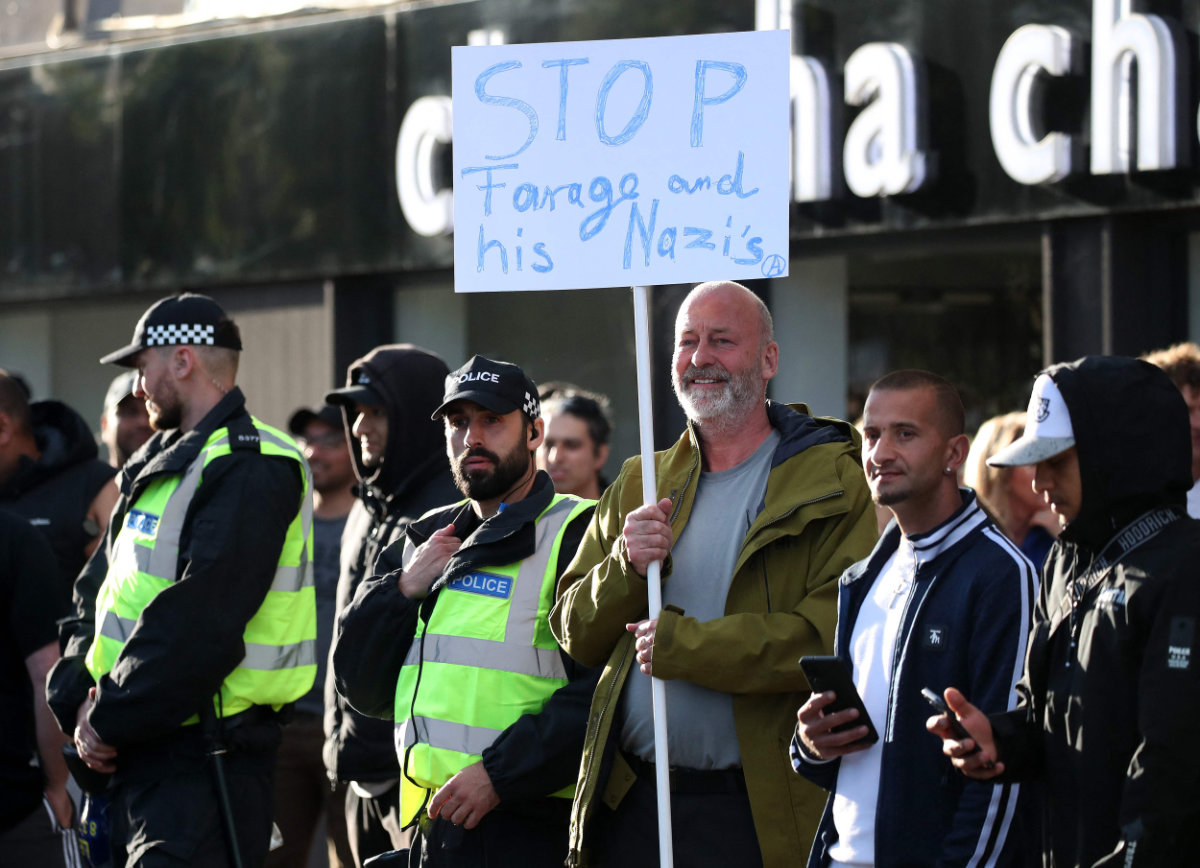
A person holds a placard reading 'Stop Farage and his Nazi's' during a counter demonstration against an anti-immigration protest called by far-right activists, in Newcastle-upon-Tyne, north-east England on August 7, 2024. (AFP)
Although asylum seekers are not allowed to work, nor do they receive a house or substantial welfare payments while their applications are reviewed, a section of the public in the UK fears the needs of new arrivals are being placed ahead of their own, while the racial composition of their communities changes around them.
Despite this, voter behavior in the UK’s recent general election suggests immigration is not a priority issue for most. “A much better (though still imperfect) indicator is a national election,” Noah Carl, a sociologist and right-wing commentator, wrote in a recent piece for Aporia Magazine.
“Britain held one just a few weeks ago, and the results provide little basis for saying ‘the English’ have ‘had enough’ of mass immigration. Fifty-six percent of white people voted for left-wing or progressive parties, and another 26 percent voted for the Conservatives (a de-facto pro-migration party). Only 16 percent supported Reform.
“In fact, the share of white people supporting left-wing or progressive parties increased from 2019. I say this as someone with broadly restrictionist views.

Members of the local community help to clear debris from the streets in Middlesbrough, England on August 5, 2024, following rioting and looting the day before. (AFP)
“Now, you might claim the situation has changed since the election, owing to the rioting in Leeds, the stabbing in Southport and other incidents. But it hasn’t really changed.
“Before the most recent election, white British people had already been subjected to Islamist terrorism, grooming gangs, BLM riots, the ‘decolonization’ movement, accusations of ‘white privilege,’ etc. Yet they still chose to vote overwhelmingly for pro-migration parties.
“Although polling suggests most Britons do want immigration reduced, they apparently care more about issues like the cost of living, housing and the NHS.”
Many commentators have therefore placed much of the blame on social media platforms for acting as an accelerant for the violence, while rioters whipped up by misinformation seek to emulate the disorder seen elsewhere in the country and fed to their smartphones.
Some of the blame, however, may also rest with the pervading political discourse in the UK today.
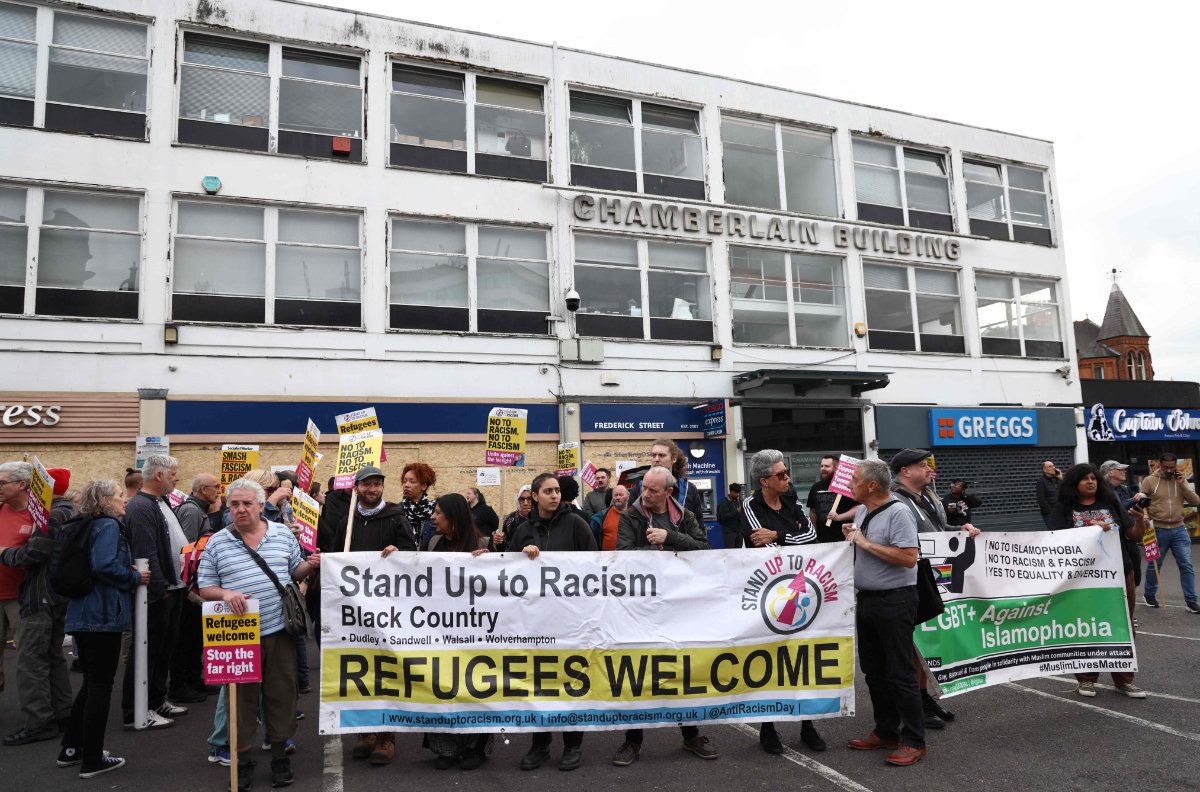
People hold a banner reading "Refugees welcome" during a counter demonstration against an anti-immigration protest called by far-right activists in Birmingham, England, on August 7, 2024. (AFP)
Paul Reilly, senior lecturer in communications, media and democracy at the University of Glasgow, said one underlying cause may be the absence of accountability for social media platforms in allowing misinformation to spread. But he also pointed to another group.
“I would argue political commentators, influencers and politicians have played a key role in this by creating toxic political discourse around migration,” Reilly told Arab News.
“Social media platforms could do better on removing hate speech and misinformation. But they aren’t treated as publishers and held accountable for content they host. I would expect debate over temporary shutdowns of online platforms during civil unrest as a viable policy.”
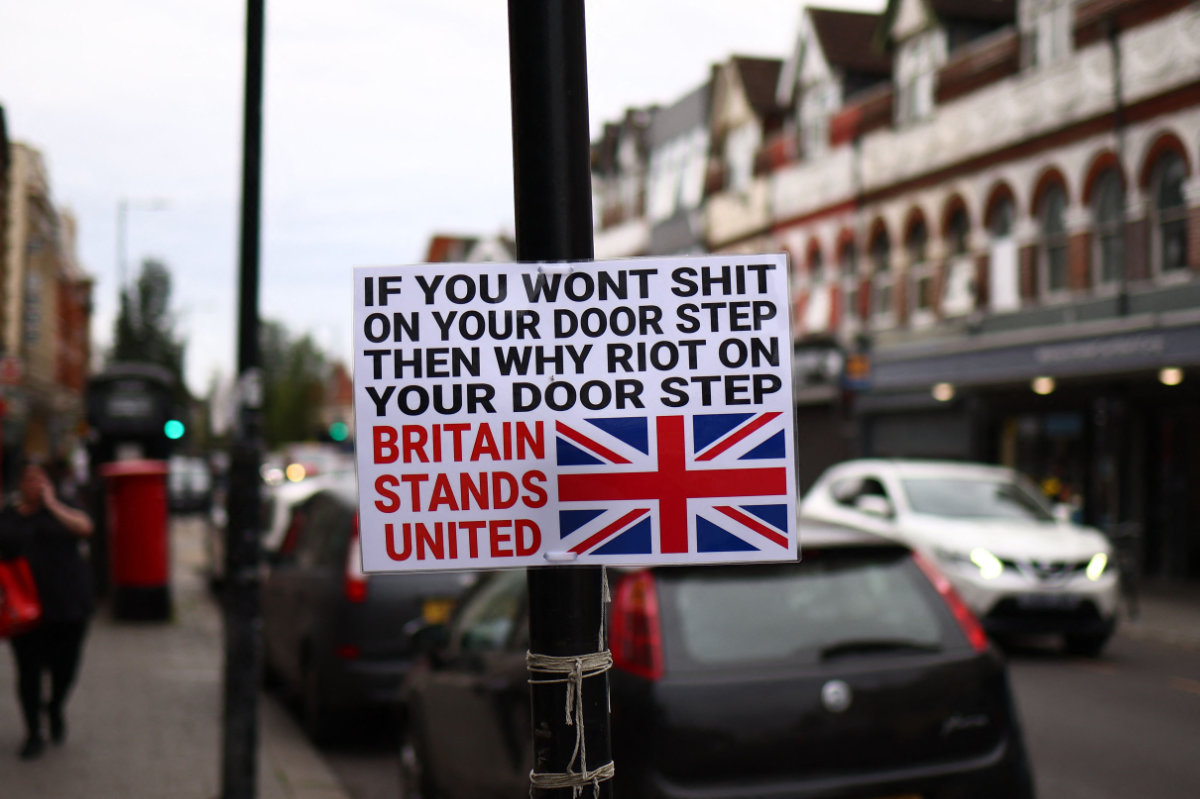
A sign is tied onto a street pole ahead of an anti-immigration protest called by far-right activists in Westcliff, eastern England, on August 7, 2024. (AFP)
Nonetheless, Reilly has also challenged the assertion of Southport MP Patrick Hurley that the violence playing out was solely down to “lies and propaganda” spread on social media.
Instead, citing his research into social media’s role in political unrest in Northern Ireland, he says that while online platforms have been used to share rumors and misinformation, that have inflamed tensions, such online activity has tended to “follow rather than precede riots.”
Writing in The Conversation, he said: “If political leaders are serious about avoiding further violence, they should start by moderating their own language.”
However, he added: “It is expedient for politicians to blame online platforms rather than acknowledge their role in producing a toxic political discourse in relation to asylum seekers and immigration.”
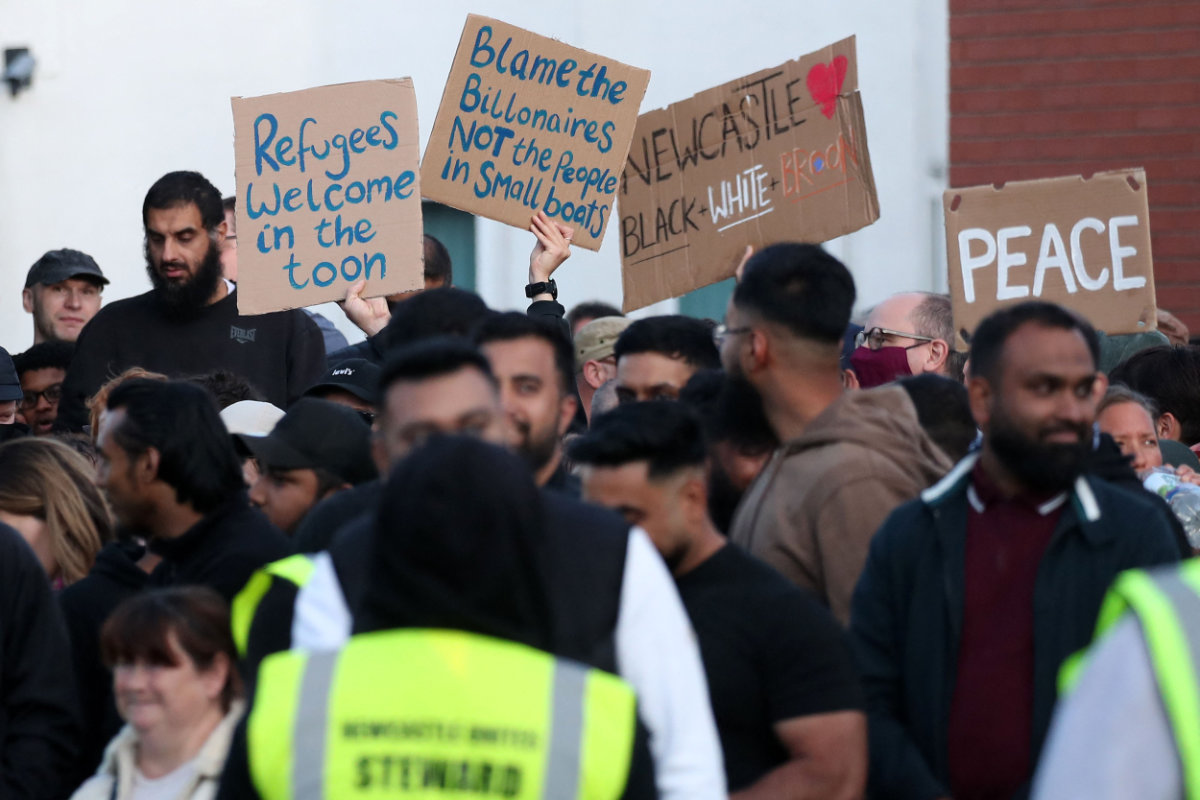
People hold pro-refugee, anti-racist placards as they attend a counter demonstration against an anti-immigration protest called by far-right activists in Newcastle-upon-Tyne, England on August 7, 2024. (AFP)
One legal researcher, who asked not to be named, told Arab News the riots were a symptom of failures to address widening wealth inequalities, which had created a space for misinformation to spread.
“It is simply a replication of what we have seen time and time again with the cutting of public services. Amid an absence of government accountability, the population will look for someone to blame,” the person said.
“If there’s one bright spark, those coming out to clean up after the rioters seem to represent a far higher portion of the affected communities, indicating that for a government who cares, there is still buy-in for a better tomorrow.”
